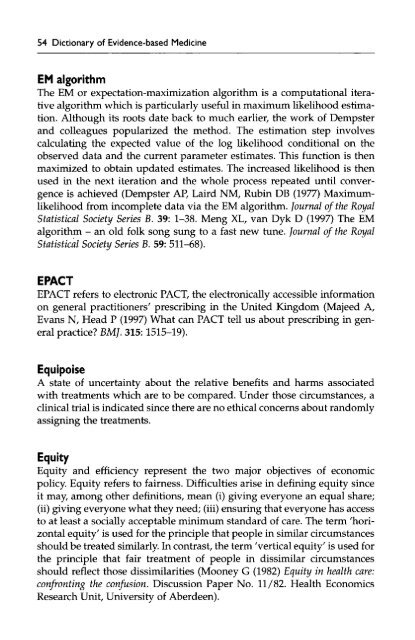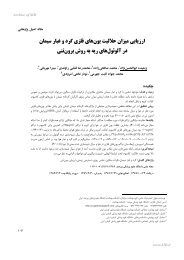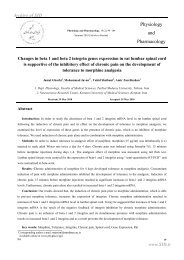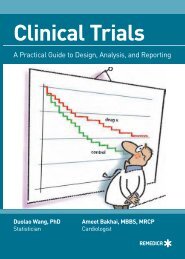Dictionary of Evidence-based Medicine.pdf
Dictionary of Evidence-based Medicine.pdf
Dictionary of Evidence-based Medicine.pdf
Create successful ePaper yourself
Turn your PDF publications into a flip-book with our unique Google optimized e-Paper software.
54 <strong>Dictionary</strong> <strong>of</strong> <strong>Evidence</strong>-<strong>based</strong> <strong>Medicine</strong><br />
EM algorithm<br />
The EM or expectation-maximization algorithm is a computational iterative<br />
algorithm which is particularly useful in maximum likelihood estimation.<br />
Although its roots date back to much earlier, the work <strong>of</strong> Dempster<br />
and colleagues popularized the method. The estimation step involves<br />
calculating the expected value <strong>of</strong> the log likelihood conditional on the<br />
observed data and the current parameter estimates. This function is then<br />
maximized to obtain updated estimates. The increased likelihood is then<br />
used in the next iteration and the whole process repeated until convergence<br />
is achieved (Dempster AP, Laird NM, Rubin DB (1977) Maximumlikelihood<br />
from incomplete data via the EM algorithm. Journal <strong>of</strong> the Royal<br />
Statistical Society Series B. 39: 1-38. Meng XL, van Dyk D (1997) The EM<br />
algorithm - an old folk song sung to a fast new tune. Journal <strong>of</strong> the Royal<br />
Statistical Society Series B. 59: 511-68).<br />
EPACT<br />
EPACT refers to electronic PACT, the electronically accessible information<br />
on general practitioners' prescribing in the United Kingdom (Majeed A,<br />
Evans N, Head P (1997) What can PACT tell us about prescribing in general<br />
practice BMJ. 315: 1515-19).<br />
Equipoise<br />
A state <strong>of</strong> uncertainty about the relative benefits and harms associated<br />
with treatments which are to be compared. Under those circumstances, a<br />
clinical trial is indicated since there are no ethical concerns about randomly<br />
assigning the treatments.<br />
Equity<br />
Equity and efficiency represent the two major objectives <strong>of</strong> economic<br />
policy. Equity refers to fairness. Difficulties arise in defining equity since<br />
it may, among other definitions, mean (i) giving everyone an equal share;<br />
(ii) giving everyone what they need; (iii) ensuring that everyone has access<br />
to at least a socially acceptable minimum standard <strong>of</strong> care. The term 'horizontal<br />
equity' is used for the principle that people in similar circumstances<br />
should be treated similarly. In contrast, the term Vertical equity' is used for<br />
the principle that fair treatment <strong>of</strong> people in dissimilar circumstances<br />
should reflect those dissimilarities (Mooney G (1982) Equity in health care:<br />
confronting the confusion. Discussion Paper No. 11/82. Health Economics<br />
Research Unit, University <strong>of</strong> Aberdeen).










